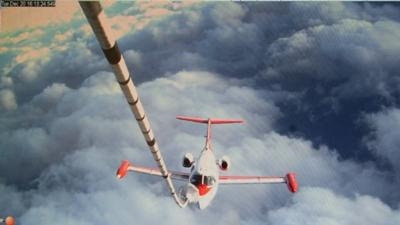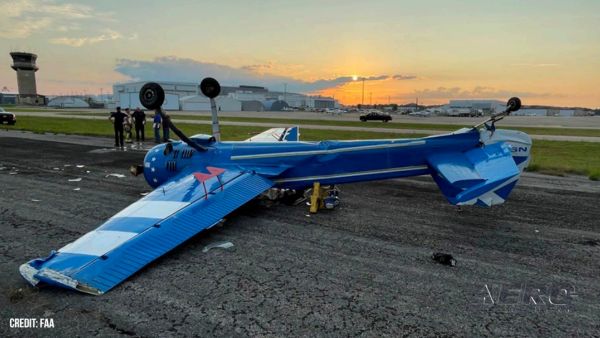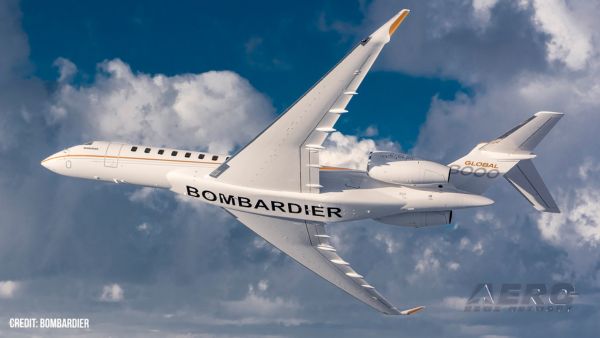Wed, Jan 25, 2012
System Under Development That Could Significantly Increase The
Endurance And Range Of Carrier-Based Unmanned Aircraft
As part of the Unmanned Combat Air System Demonstration (UCAS-D)
program, the Navy and industry partner Northrop Grumman have been
developing Autonomous Aerial Refueling (AAR) technologies to refuel
unmanned aircraft in flight. The team completed a series of flight
tests Jan.21 in St. Augustine, FL, as the latest step toward
demonstrating unmanned AAR capability.
Image Provided By NAVAIR

“The AAR segment of the program is intended to demonstrate
a system that will enable the X-47B UCAS-D to safely approach and
maneuver around tanker aircraft, performing both Navy and Air Force
style refueling techniques,” said Capt. Jaime Engdahl, Navy
UCAS program manager.
The Navy has been working closely with the Air Force Research
Lab for the past decade to develop technologies and operating
concepts for AAR, Engdahl said. Both services share a common goal
of enabling tankers to autonomously refuel manned and unmanned
aircraft in the future, he added.
The UCAS-D team began this test phase in November when a team
from Northrop Grumman installed X-47B hardware and software on a
Calspan Learjet surrogate aircraft. The initial ground and taxi
tests culminated in the first AAR test flight Dec. 20. The team
then conducted a series of flights using the surrogate aircraft,
equipped with X-47B software and hardware, and an Omega K-707
Tanker. The Learjet successfully completed multiple air-refueling
test points autonomously while commanded by a ground operator.
The AAR segment of the UCAS-D program is designed to assess the
initial functionality of the X-47B AAR systems and navigation
performance, as well as to test the government tanker refueling
interface systems. The AAR program is using similar command and
control, and navigation processes being demonstrated by the UCAS
team aboard the aircraft carrier. “The next big step for the
program is to demonstrate this capability with the unmanned X-47B
and actually plug the aircraft autonomously,” Engdahl said.
“The AAR team did an exceptional job executing flight test in
St. Augustine. The team’s' ability to successfully complete
these test maneuvers so early in the program is a significant
learning event and reduces risk for the future."
The team plans to conduct two more surrogate test periods before
demonstrating refueling techniques on the X-47B in 2014. Data from
the tests will be used to assess system performance, demonstrate
viability of the AAR concept and develop operational procedures to
support further development of future unmanned systems. "By adding
an autonomous aerial refueling capability to unmanned aircraft, we
can significantly increase their range, persistence and overall
flexibility," added Engdahl, who said he is very impressed with the
system’s performance. “This is a game-changer for naval
aviation and is critical for our success with unmanned long range
aircraft in the future.”
More News
“Each Honor Flight mission is a special occasion, but the ability to be a part of EAA AirVenture always creates unforgettable moments. Honoring our local Vietnam veterans out>[...]
From 2015 (YouTube Edition): The Airframes Displayed At AUVSI 2015 Were Quite Innovative It’s common to visualize a small vertical lift UAV as having 4 to 6 propellers, it&rs>[...]
The Airplane Began A Descent While Still In A Right Turn And Impacted Terrain On March 13, 2025, about 0733 central daylight time, a Cessna 525A airplane, N525CZ, was destroyed whe>[...]
It Looks Like It's Gonna Get A Bit Tight, Klyde FMI: www.klydemorris.com>[...]
Also: Blackhawk’s Replacement, Supersonic Flight, Archer 1Q/25, Long-Range VTOL Program U.S. Secretary of Transportation Sean P. Duffy released an update on progress being ma>[...]
 Aero-News: Quote of the Day (05.25.25)
Aero-News: Quote of the Day (05.25.25) Classic Aero-TV: Efficient Versatility -- NASA GL-10 Greased Lightning
Classic Aero-TV: Efficient Versatility -- NASA GL-10 Greased Lightning NTSB Prelim: Cessna 525
NTSB Prelim: Cessna 525 Klyde Morris (05.23.25)
Klyde Morris (05.23.25) Airborne-NextGen 05.20.25: Drone Regs, Zero-Emission Cargo, Door-Dash Drone
Airborne-NextGen 05.20.25: Drone Regs, Zero-Emission Cargo, Door-Dash Drone



